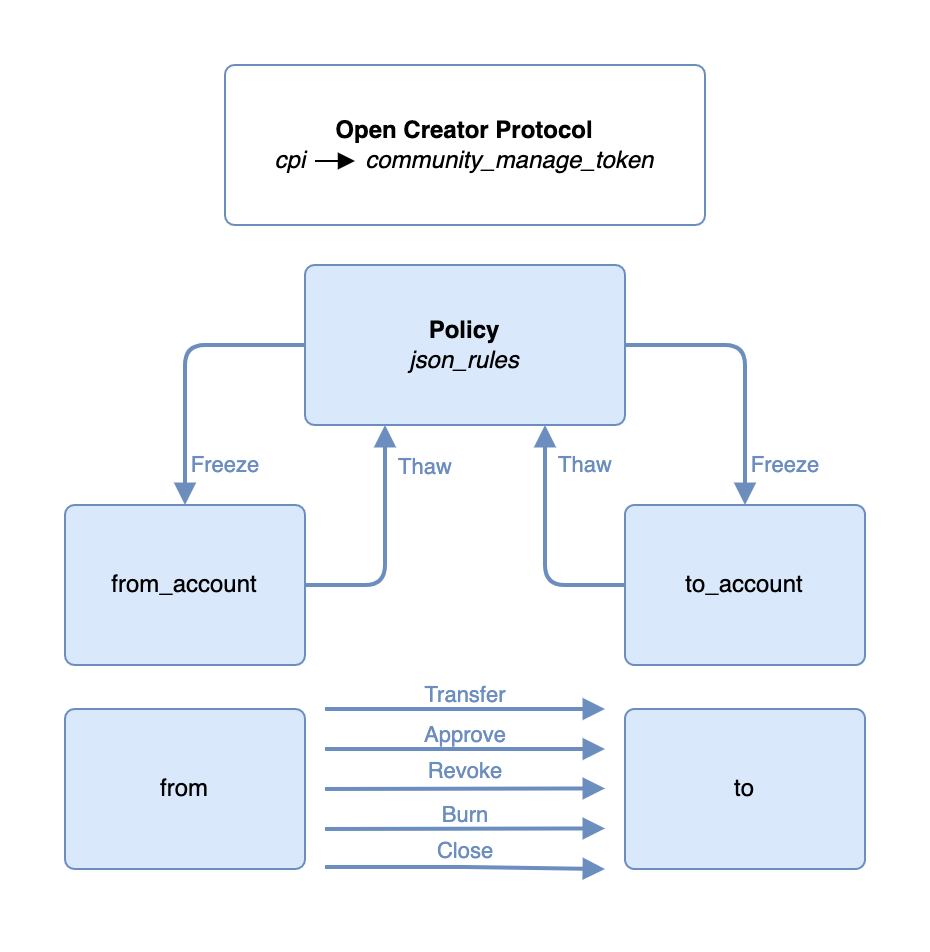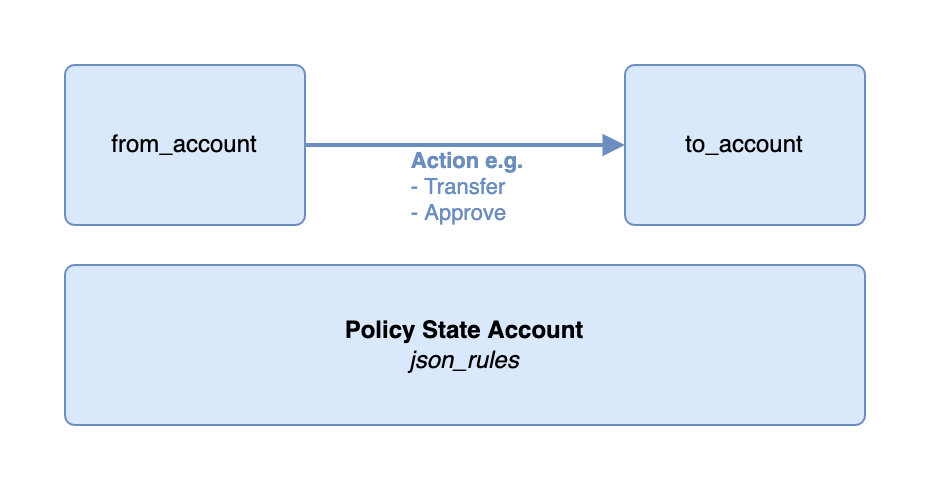Concepts
OCP uses SPL managed-token as the
base for holding the freeze authority of the spl-token. And managed-token has 1:1
feature parity of the spl-token in terms of the token interfaces like transfer, approve, revoke, burn, close,
init_account and mint_to.

Action Context
Action context is the context used to build the json rules engine. OCP's solution is a JSON rules engine DSL to define what can be applied to the context.
pub struct ActionCtx {
pub action: String,
pub program_ids: Vec<String>,
pub mint: String,
pub mint_state: MintStateCtx,
pub mint_account: Option<MintAccountCtx>,
pub metadata: Option<MetadataCtx>,
pub payer: Option<String>,
pub from: Option<String>, // owner of the from_account, and many action's initiator
pub to: Option<String>, // owner of the to_account
pub last_memo_signer: Option<String>,
pub last_memo_data: Option<String>,
}

Onchain Policy Engine
OCP utilises the JSON Rules Engine package, for more information please see the repository.
| Sample Use Cases | Policy (json_rule) |
|---|---|
| Allow For All | null |
| Program IDs Allowlist | { "field": "program_ids", "operator": "string_is_subset", "value": ["1111111111111111111111111111111"]} |
| Program IDs Denylist | { "field": "program_ids", "operator": "string_does_not_contain_any", "value": ["1111111111111111111111111111111"]} |
| Soulbound Token | { "field": "mint_state/transferred_count", "operator": "int_less_than", "value": 1 } |
| Semi Soulbound Token | { "field": "mint_state/transferred_count", "operator": "int_less_than", "value": n } |
| Transfer Timestamp Constraint | { "field": "mint_state/derived_datetime/utc_timestamp", "operator": "int_greater_than", "value": 1669881409} |
| Transfer Cooldown Token | { "field": "mint_state/derived_cooldown", "operator": "int_greater_than", "value": 3600 } |
| Metadata Name Filter | { "field": "metadata/name", "operator": "string_has_substring", "value": "FROZEN"} |
| Metadata URI Filter | { "field": "metadata/uri", "operator": "string_has_substring", "value": "IPFS"} |
| Single Transfer Destination | { "field": "to", "operator": "string_equals", "value": ["1111111111111111111111111111111"]} |
Here's a full example of how a creator can leverage OCP to personalize the transferability. The logic works like this:
- When the
actionis nottransfer, pass - When the
actionistransfer, then one cannot transfer if themetadata/namecontains a keywordFROZEN - When the
actionistransfer, then one cannot transfer to a specific address if themetadata/namedoesn't containWINNER.
Example of the "Magic Mint"'s complex policy can be found on the solana explorer link.
{
"events": [],
"conditions": {
"or": [
{
"field": "action",
"operator": "string_not_equals",
"value": "transfer"
},
{
"and": [
{
"not": {
"field": "metadata/name",
"operator": "string_has_substring",
"value": "FROZEN"
}
},
{
"or": [
{
"field": "to",
"operator": "string_not_equals",
"value": "DWuopEsTrg5qWMSMVT1hoiVTRQG9PkGJZSbXiKAxHYbn"
},
{
"field": "metadata/name",
"operator": "string_has_substring",
"value": "WINNER"
}
]
}
]
}
]
}
}
Mint State
MintState determines if a mint (token) is with OCP or not. Mint state is a key PDA that OCP uses to associate a mint account with a policy and some state information related to the mint account.
pub struct MintState {
pub version: u8,
pub bump: [u8; 1],
pub mint: Pubkey,
pub policy: Pubkey,
pub locked_by: Option<Pubkey>,
pub last_approved_at: i64,
pub last_transferred_at: i64,
pub transferred_count: u32,
}
One can use the findMintStatePk to test if a mint account has a MintState account, and then leverage what OCP program provides.
export const findMintStatePk = (mint: PublicKey) => {
return PublicKey.findProgramAddressSync(
[utils.bytes.utf8.encode("mint_state"), mint.toBuffer()],
PROGRAM_ID
)[0];
};
const mintStatePk = findMintStatePk(mint);
const mintStateAcc = await conn.getAccountInfo(mintStatePk): // returns null | AccountInfo<Buffer>, and then you can decide if it's OCP going forward.
Dynamic Royalties
Creators can specify a relationship between an NFT’s sale price and royalty amount via a linear price curve. And more
curve types to be supported in the future. The first dynamic royalty curve OCP supports is DynamicRoyaltyPriceLinear.
Both start_multiplier_bp and end_multiplier_bp are relative multipliers based on the
Metaplex's metadata.seller_fee_basis_points.
pub struct DynamicRoyaltyPriceLinear {
pub price_mint: Option<Pubkey>,
pub start_price: u64,
pub end_price: u64,
pub start_multiplier_bp: u16,
pub end_multiplier_bp: u16,
}
Specifically, if we note that r is the final multiplier_bp, then:
For example, given the following dynamic royalty setting:
DynamicRoyaltyPriceLinear:
{
start_price: 0 SOL
end_price: 5 SOL
start_multiplier_bp: 100% (10000 bp)
end_multiplier_bp: 50% (5000 bp)
}
Metadata:
seller_fee_basis_points: 5% (500 bp)
price: 0 SOL ===> royalty_bp: 500 (5%)
price: 2.5 SOL ===> royalty_bp: 375 (3.75%)
price: 5 SOL ===> royalty_bp: 250 (2.5%)